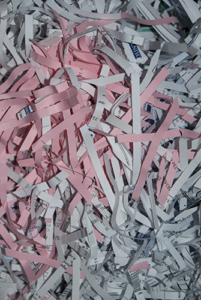 Most—but not all—identity theft now occurs electronically. But your identity can still be easily scored by thieves who make use of what you toss in your waste basket, too.
Most—but not all—identity theft now occurs electronically. But your identity can still be easily scored by thieves who make use of what you toss in your waste basket, too.
Trash facilities and recycling centers can be gold mines of personal information for enterprising dumpster divers. That is, unless you shred documents that contain identifying information—charge receipts, credit applications, insurance forms, physician statements, canceled checks and bank statements and even expired charge cards.
Beware also of those bothersome credit offers you get in the mail and toss unopened into the trash—particularly the pre-approved variety. Clever scammers complete these blank applications, obtain a credit card in your name, charge it to the limit and close the account before you receive the first billing statement. To protect yourself, all you have to do is tear the unopened envelop in half once or twice before tossing it in the waste basket.
Better yet, you can eliminate these prescreened credit offers from your mailbox by calling 1-888-5-OPT-OUT (1-888-567-8688) to opt out. You’ll be asked to provide your Social Security number so the consumer reporting companies can match you with your file.
Also, deposit your outgoing mail containing personally identifying information in post office collection boxes or at your local post office, rather than in an unsecured mailbox. Promptly remove mail from your mailbox. If you’re planning to be away from home and can’t pick up your mail, contact the U.S. Postal Service at 1-800-275-8777 or online at www.usps.gov to request a vacation hold. The Postal Service will hold your mail at your local post office until you can pick it up or are home to receive it.
The Federal Trade Commission has more information on identity theft and prevention tips at www.ftc.gov/bcp/edu/microsites/idtheft/.




